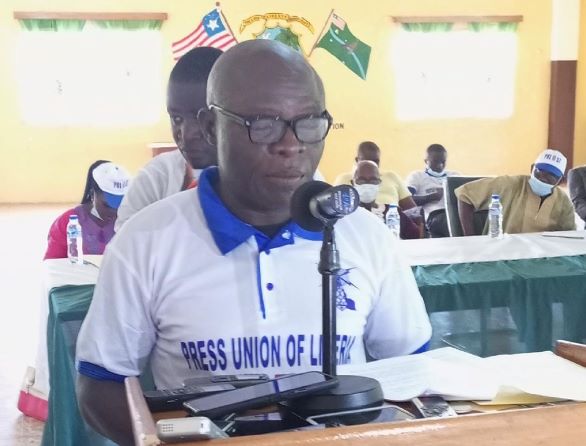PHOTO: PUL Pres. Coffey
At the Press Union of Liberia 57th anniversary program in this northwestern city, PUL President, Charles Coffey has asserted that the refusal of media executives or owners to sign the Collective Bargaining Agreement (CBA) is serving as a major impediment for Liberia Journalists.
According to Mr. Coffey, the current working conditions of most journalists in Liberia represents is bad and this is seriously impeding their function in line with ethical and professional obligations.
Poor condition of service for Journalists remains a major concern in the country.
Mr. Coffey added that the state of the professional organization, which often seeks the basic capacities and means to design sustainable, progressive programs of action on behalf of their members, required immediate and direct Interventions of media owners if realistic prospects for meaningful change were to be realized.
The head of the umbrella group for Liberian Journalist adding that many journalists working in the country have no job security and they are deprived from any form of social security, health benefits, while some are owed numerous months of salary arrears.
Closely related to this, Mr. Coffey said, is the fact that many Liberian journalists, particularly those in the lower cadre who work as reporters are poorly paid and ill motivated.
According to him, this partly explains the poor performances of some of these Journalists and most importantly, the continuous disregard of the ethics of the profession, the Union’s President noted.
In the light of these critical issues, Mr. Coffey reported that there has been a clarion call for a collective bargaining standard framework that will to some extent determine what Journalists are paid, their conditions of service in relation to the qualifications that they have and their level of professionalism.
The Union is in the forefront of this crucial course and is confident that the desired results will come sooner rather than later. Already there have been great strides in this regard in Liberia and Standard Collective Agreement has been developed, while collective negotiations have been launched at national level.
However, there still remains a herculean task ahead. Most media owners and executives have often not been committed to any form of collective bargaining agreement for their workers, while the appalling economic condition has made the situation worse. PUL had earlier planned media economic conference, but it didn’t materialize due to the COVID-19 outbreak, which disallowed our good media partner, the European Union Delegation to Liberia to hold the conference.
“The European Union delegation was working with PUL to hold the conference. We are optimistic, that with the cases reducing and people are being fully vaccinated, we will by the grace of God hold the media economic conference and at the end we will develop the business model of the media,” the PUL President announced.
Notwithstanding, he said, some media institutions including print and electronic have gone beyond the bench mark of the draft PUL collective bargaining agreement.
According to him, these media outlets are paying journalist between 100 and 200 as beginner and between 300 and 500 and above USD for editors depending on the status of the journalist or media workers.
“We are calling on most of the media institutions that far below the belt or lacking behind to double up. Journalists and media workers deserve the best remuneration and other benefits. We also calling government and business entities to do more advertisement in the traditional media and not just social media. This will help improve the media economy. The poor media economy is forcing many grass root media institutions into self-censorship,” PUL President Coffey added.

